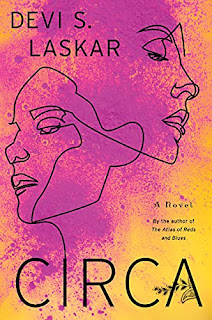Devi S. Laskar is the author of the new novel Circa. Her other books include the novel The Atlas of Reds and Blues. She lives in the San Francisco Bay area.
Q: What inspired you to write Circa, and how did you create your character Heera?
A: I began this story in the 1990s in New York when I was a graduate student. I was inspired by Italo Calvino’s Invisible Cities, and writing about a series of friendships, most especially with my good friend Susan whom I met years before in Illinois.
Sadly, Susan was diagnosed with acute leukemia -- after two bone marrow transplants, she died. I had to set aside this story. In 2010, through no fault of my own, I lost my computer and the bulk of my work, including this novel.
When I finally came back to this book after my debut novel was published in 2019, I still loved my two main characters but I had changed as a person and a writer. Now I wanted to write a story as it intersected with patriarchy, identity, assimilation and how to come to terms with grief.
So I kept Heera, adopted the second person narrator so as to collapse the distance between reader and narrator and let everything else go.
Q: The author Janet Fitch called the book “A subtle exploration of fate and free will.” What roles do you see fate and free will playing in the novel?
A: Such a good question! I think for a lot of immigrant families, there is a battle between “destiny” and “free will” – someone in the family (a parent, a grandparent) made a choice to leave home and start anew: in Heera’s case, her parents.
Once a certain amount of stability and success had been achieved, then the default position of Heera’s parents was to revert back to more traditional perspectives and values, such as “fate.” It is a struggle that Heera has to contend with, and ultimately, balances.
Q: How was the novel’s title chosen, and what does it signify for you?
A: The novel has always held this title. Circa is the historical marker when someone doesn’t know the exact date of something, such as “The first man walked on the moon circa 1970.”
Marie’s story is cut short, she will not be in the history books, and later all of the specific details of her life will be blurred. So I wanted to title the book Circa to give readers a chance to think about the people in their lives that made a difference but won’t make it in to the history books.
Q: Another assessment, from the writer Maya Shanbhag Lang, says, “Here is a coming-of-age novel about family expectations and hyphenated identities, about what it means to grow up in an America that does not always want you, about having parents who don't always want America, and the ripple effects of that ambivalence.” What do you think of that description?
A: Maya’s description is spot-on. Being the American child of immigrants is complex as well as complicated. There are so many hierarchies to navigate. I think Maya described those feelings beautifully.
Q: What are you working on now?
A: I’m writing my third novel, Midnight, at the War, which Mariner Books will publish in early 2024. It is a story of a foreign correspondent who is brown-skinned and female, thrust back in to a war-torn region. It is a story about truth and who gets to tell it, and about morality and America.
Q: Anything else we should know?
A: I was 52 when my debut novel was released and I’m 55 years old now.
In this youth-obsessed, ageist American culture, I want people to know that it’s never too late to achieve your dreams, that if you want to write, you should, that the people who send their work out and collect rejections are the same people who get published.
I began this story in 1995, my friend died a year later -- a quarter of a century has flown by, and I have a novel in my hands today dedicated to her.
--Interview with Deborah Kalb


No comments:
Post a Comment